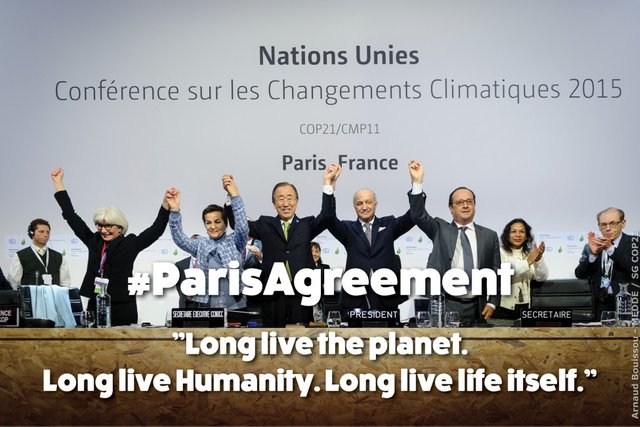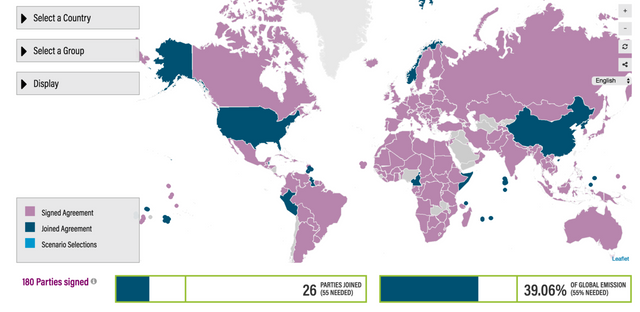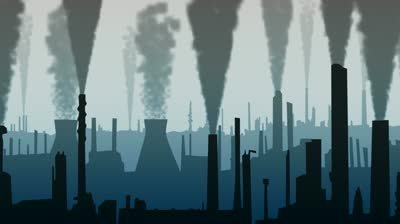A Sustainability Dialogue: Why the State System Cannot Fulfill the Paris Agreement on Climate Change
I graduated from American University with a BA in International Studies in December 2015 with a regional focus on Asia and a specialty in Environmental Sustainability and Global Health. I studied abroad at National Chengchi University in Taiwan. Im writing this series on sustainability to (as the title suggests) create a dialogue on a topic that I think is vital, and will become more so over the coming years.

Introduction
Back in December of 2015, the Paris Agreement, formed within the framework of the United Nations Convention on Climate Change, was signed by more than 90% of states represented. This agreement, touted by the leaders of some of the world's most powerful states as the first step towards truly combatting climate change in a globally effective manner, dealt with lowering greenhouse gas emissions, state adaptation to a changing world, and financial planning for enacting the proposed plans starting in 2020. Thats great, heres why it wont work.

Goals of the Paris Agreement
- "Holding the increase in the global average temperature to well below 2 °C above pre-industrial levels and to pursue efforts to limit the temperature increase to 1.5 °C above pre-industrial levels, recognizing that this would significantly reduce the risks and impacts of climate change;
- Increasing the ability to adapt to the adverse impacts of climate change and foster climate resilience and low greenhouse gas emissions development, in a manner that does not threaten food production;
- "Making finance flows consistent with a pathway towards low greenhouse gas emissions and climate-resilient development."
Source
They further aim to to reach the global peak of greenhouse gas emissions as soon as possible.
Why the Agreement is Meaningless
1) The language of the agreement is intentionally vague, and there are no accountability measures other than a "name and shame" system. The agreement is not even legally binding. Source
2) There are no unilateral measures that should be taken by individual countries. Instead, each country is supposed to submit a "Intended Nationally Determined Contribution" plan, to be updated to be more ambitious every 5 years. Inherent to this is that it makes it very difficult for the UN to monitor whether or not individual countries are living up to their pledges, since these proposed plans can be long, complex, and become bogged down in bureaucracy. In essence, the UN wont even know when to shame. As James Hansen, father of the climate change movement, says
Its a fraud really, a fake. It's just bullshit for for them to say: ‘We’ll have a 2C warming target and then try to do a little better every five years.' It’s just worthless words. There is no action, just promises. As long as fossil fuels appear to be the cheapest fuels out there, they will be continued to be burned.”

3) The fact that the agreement was signed by 179 nations that first day does not mean that its stipulations are coming into effect. It means that the agreement is now open for ratification. In order for the agreement to go into international effect, it must be ratified by at least 55 countries representing at least 55% of all global emissions. It is not an enacted agreement. As of 9/6/2016, only 26 countries countries representing 40% of emissions have ratified the agreement (notably China and the USA signed together on September 3rd.)
Source
a) It should, however, be noted that the majority of Europe will likely sign the bill, but none of them (other than Norway) have signed yet due to complications with the legal complications that the European Union provides.

4) A recent study published in the journal Nature indicates that current emission reduction goals as indicated by individual countries' "Nationally Determined Contributions" would still lead to a "median warming of 2.6-3.1 degrees Celsius by 2100." Source
Tragedy of the Commons
The tragedy of the commons is a term coined in 1833 by famous economist William Forster Lloyd. It refers to the concept that unrestricted access to a finite resource will ultimately lead to over-exploitation. This occurs because the benefits of using the resource go to individual actors, each of whom is motivated to use as much of that resource as possible, while the costs are borne by all those to who the resource is available. This then causes demand for the resource to increase, and overexploitation to accrue until the resource collapses.

The Paris Agreement is a perfect example of the Tragedy of the Commons. It is within each individual actor's (in this case the state) short-term best interest to keep on consuming as much of the resources that cause greenhouse gas emissions as possible. The short-term economic benefit of doing thus makes it almost impossible not to do so because if state A decides to break away from that resource, state B will take it's place and thus benefit from the resource...while State A still has to pay for the consequences (global warming). The only way to break the tragedy of the commons is to create a system where the cost of using the resource is paid by the one using it. Which leads me to...
Emission Based Taxation
In my opinion, the only way to motivate states to fulfill promises such as those made in the Paris Agreement is to create an international emission taxation system. Each country, depending on their size, population, level of development, and the maximum emissions allowed to prevent global temperatures rising above 2 degrees Celsius higher than pre-industrial levels, should be given an emission cap. For every tonne of emissions above that cap, a certain tax should be paid to a UN run and internationally led oversight organization who then uses those taxes to fund the development of clean energy infrastructure in the poorest and developing countries. Nothing motivates governments more effectively than the prospect of losing money!

Conclusion
As with most things political, the Paris Agreements were all talk, no action. They were lauded by media around the world for their drama and because it was supposedly the first time that the world had come together to combat climate change. However, the actions proposed were not aggressive enough, even supposing the international community followed through on its promises (which it probably wont.)
Fortunately and unfortunately, large parts of the world are already experiencing the detrimental effects of climate change. (Have you seen the pollution in China lately?) Hopefully this will motivate states to take it upon themselves to force through climate legislature that will be aggressive enough to at least mitigate, if not prevent, the possible dangers of rapid climate change.
Sources
- https://www.theguardian.com/environment/2015/dec/12/james-hansen-climate-change-paris-talks-fraud
- http://ec.europa.eu/clima/policies/international/negotiations/paris/index_en.htm
- http://www.nytimes.com/2016/09/04/world/asia/obama-xi-jinping-china-climate-accord.html?rref=collection%2Ftimestopic%2FChina&action=click&contentCollection=world®ion=stream&module=stream_unit&version=latest&contentPlacement=10&pgtype=collection&_r=0
- http://www.pbs.org/wgbh/frontline/article/fairness-out-shame-in-the-psychology-of-the-paris-climate-talks/
- http://www.efinancialnews.com/story/2016-01-25/un-climate-conference-cop21-laurent-fabius-carbon-emissions-calpers-calstrs
- https://www.washingtonpost.com/news/energy-environment/wp/2016/06/29/a-sweeping-new-analysis-shows-why-our-planetary-carbon-math-is-still-falling-short/?utm_term=.d1d47823f87c
- http://www.nature.com/articles/nature18307.epdf?referrer_access_token=QeMPbyCDSg5390u28KfDAtRgN0jAjWel9jnR3ZoTv0OA8rU9i17EJIQSL3USPiac2178_mA2l_qGL7h-hmMlgwVAFU2_V-M1dezuPyTAXrpKEKYqjBRJB6fPyBzDtFGuc6Ue7vucO4ndduuTEyflARx3iksC4IxOXpRT3r_l4E1CJoc0j7f4orHtBdAciOOtikHrt_m4dqFOY2yHiPS2RI_fpiv2nJZH8U9WqfRqBctATtDSYzgdj6WY3yc-jbxe-ohxydAHdlC99h_U3JbdUM_EMhLXmriUdagOV2OGDv5WJ3DUDRwhZvzKW1G103--hkCkLnh9P6j52QAq5mfTyuTgBLTd1qNAWvAxFyUX3lSrXRv240vRI84EGVHyoPj2&tracking_referrer=www.washingtonpost.com
@victor-lucas
Because of Corporatism. I wrote about it yeterday mentioning the Kyoto treaty as an example
https://steemit.com/capitalism/@kyriacos/capitalism-isn-t-corporatism
@kyriacos
I absolutely agree that corporatism is part of the problem. Im curious though, in your post are you advocating for a completely laissez faire society? Do you believe that businesses that are allowed to run completely unchecked by outside forces will check each other? Im just thinking about things such as monopolies or price fixing collusion.
it won't work because humans have no more hope of stopping climate change than we did responsibility in causing it.